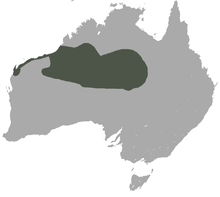The lesser hairy-footed dunnart (Sminthopsis youngsoni) is a small carnivorous Australian marsupial of the family Dasyuridae. It is a widespread and fairly common species, being found in many desert areas of Western Australia, Northern Territory and Queensland.[3] Its foraging strategies have been studied by Haythornthwaite and Dickman.[4]
| Lesser hairy-footed dunnart[1] | |
|---|---|

| |
| Scientific classification | |
| Domain: | Eukaryota |
| Kingdom: | Animalia |
| Phylum: | Chordata |
| Class: | Mammalia |
| Infraclass: | Marsupialia |
| Order: | Dasyuromorphia |
| Family: | Dasyuridae |
| Genus: | Sminthopsis |
| Species: | S. youngsoni
|
| Binomial name | |
| Sminthopsis youngsoni | |

| |
| Lesser hairy-footed dunnart range | |
The lesser hairy-footed dunnart is distinguished from the very similar hairy-footed dunnart by its smaller size and less hairy soles.[3]
Population dynamics
editDuring dry periods, hairy-footed dunnart populations remain stable, instead of experiencing a boom-bust cycle like sandy inland mice.[5]
References
edit- ^ Groves, C. P. (2005). Wilson, D. E.; Reeder, D. M. (eds.). Mammal Species of the World: A Taxonomic and Geographic Reference (3rd ed.). Baltimore: Johns Hopkins University Press. p. 36. ISBN 0-801-88221-4. OCLC 62265494.
- ^ McKenzie, N.; Dickman, C. (2016). "Sminthopsis youngsoni". IUCN Red List of Threatened Species. 2016: e.T40550A21948853. doi:10.2305/IUCN.UK.2016-2.RLTS.T40550A21948853.en. Retrieved 12 November 2021.
- ^ a b Menkhorst, Peter (2001). A Field Guide to the Mammals of Australia. Oxford University Press. p. 72.
- ^ Haythornthwaite, Adele S.; Dickman, Christopher R. (April 2000). "Foraging strategies of an insectivorous marsupial, Sminthopsis youngsoni (Marsupialia: Dasyuridae), in Australian sandridge desert". Austral Ecology. 25 (2). Wiley: 193–198. doi:10.1111/j.1442-9993.2000.tb00019.x.
- ^ Stringer, Emily J.; Gruber, Bernd; Sarre, Stephen D.; Wardle, Glenda M.; Edwards, Scott V.; Dickman, Christopher R.; Greenville, Aaron C.; Duncan, Richard P. (30 April 2024). "Boom-bust population dynamics drive rapid genetic change". Proceedings of the National Academy of Sciences. 121 (18). doi:10.1073/pnas.2320590121. ISSN 0027-8424. PMC 11067018.
